
redis-vl-python
Redis Vector Library (RedisVL) interfaces with Redis' vector database for realtime semantic search, RAG, and recommendation systems.
Stars: 253
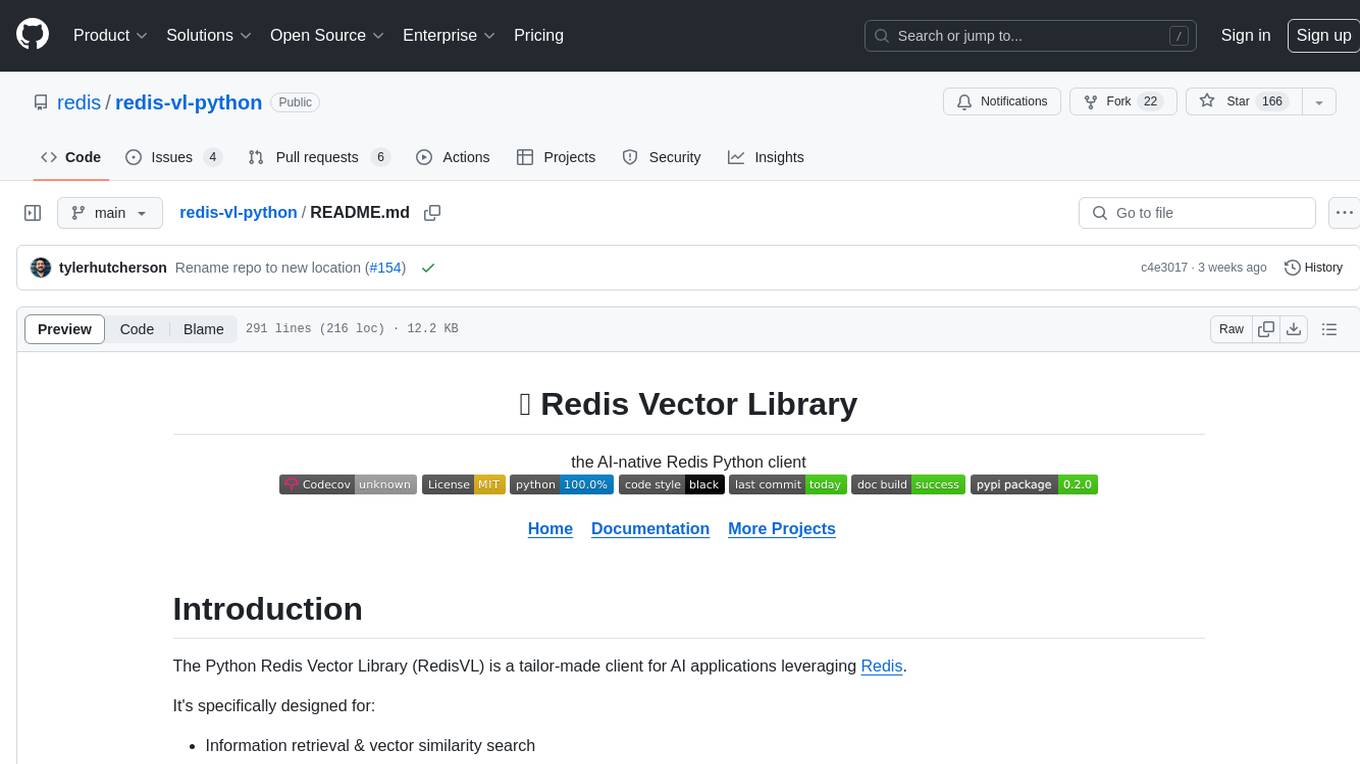
The Python Redis Vector Library (RedisVL) is a tailor-made client for AI applications leveraging Redis. It enhances applications with Redis' speed, flexibility, and reliability, incorporating capabilities like vector-based semantic search, full-text search, and geo-spatial search. The library bridges the gap between the emerging AI-native developer ecosystem and the capabilities of Redis by providing a lightweight, elegant, and intuitive interface. It abstracts the features of Redis into a grammar that is more aligned to the needs of today's AI/ML Engineers or Data Scientists.
README:
Redis Vector Library is the ultimate Python client designed for AI-native applications harnessing the power of Redis.
redisvl is your go-to client for:
- Lightning-fast information retrieval & vector similarity search
- Real-time RAG pipelines
- Agentic memory structures
- Smart recommendation engines
Install redisvl into your Python (>=3.8) environment using pip:
pip install redisvlFor more detailed instructions, visit the installation guide.
Choose from multiple Redis deployment options:
- Redis Cloud: Managed cloud database (free tier available)
-
Redis Stack: Docker image for development
docker run -d --name redis-stack -p 6379:6379 -p 8001:8001 redis/redis-stack:latest
- Redis Enterprise: Commercial, self-hosted database
- Azure Managed Redis: Fully managed Redis Enterprise on Azure
Enhance your experience and observability with the free Redis Insight GUI.
-
Design a schema for your use case that models your dataset with built-in Redis and indexable fields (e.g. text, tags, numerics, geo, and vectors). Load a schema from a YAML file:
index: name: user-idx prefix: user storage_type: json fields: - name: user type: tag - name: credit_score type: tag - name: embedding type: vector attrs: algorithm: flat dims: 4 distance_metric: cosine datatype: float32
from redisvl.schema import IndexSchema schema = IndexSchema.from_yaml("schemas/schema.yaml")
Or load directly from a Python dictionary:
schema = IndexSchema.from_dict({ "index": { "name": "user-idx", "prefix": "user", "storage_type": "json" }, "fields": [ {"name": "user", "type": "tag"}, {"name": "credit_score", "type": "tag"}, { "name": "embedding", "type": "vector", "attrs": { "algorithm": "flat", "datatype": "float32", "dims": 4, "distance_metric": "cosine" } } ] })
-
Create a SearchIndex class with an input schema and client connection in order to perform admin and search operations on your index in Redis:
from redis import Redis from redisvl.index import SearchIndex # Establish Redis connection and define index client = Redis.from_url("redis://localhost:6379") index = SearchIndex(schema, client) # Create the index in Redis index.create()
Async compliant search index class also available: AsyncSearchIndex.
-
Load and fetch data to/from your Redis instance:
data = {"user": "john", "credit_score": "high", "embedding": [0.23, 0.49, -0.18, 0.95]} # load list of dictionaries, specify the "id" field index.load([data], id_field="user") # fetch by "id" john = index.fetch("john")
Define queries and perform advanced searches over your indices, including the combination of vectors, metadata filters, and more.
-
VectorQuery - Flexible vector queries with customizable filters enabling semantic search:
from redisvl.query import VectorQuery query = VectorQuery( vector=[0.16, -0.34, 0.98, 0.23], vector_field_name="embedding", num_results=3 ) # run the vector search query against the embedding field results = index.query(query)
Incorporate complex metadata filters on your queries:
from redisvl.query.filter import Tag # define a tag match filter tag_filter = Tag("user") == "john" # update query definition query.set_filter(tag_filter) # execute query results = index.query(query)
-
RangeQuery - Vector search within a defined range paired with customizable filters
-
FilterQuery - Standard search using filters and the full-text search
-
CountQuery - Count the number of indexed records given attributes
Read more about building advanced Redis queries.
Integrate with popular embedding providers to greatly simplify the process of vectorizing unstructured data for your index and queries:
from redisvl.utils.vectorize import CohereTextVectorizer
# set COHERE_API_KEY in your environment
co = CohereTextVectorizer()
embedding = co.embed(
text="What is the capital city of France?",
input_type="search_query"
)
embeddings = co.embed_many(
texts=["my document chunk content", "my other document chunk content"],
input_type="search_document"
)Learn more about using vectorizers in your embedding workflows.
Integrate with popular reranking providers to improve the relevancy of the initial search results from Redis
We're excited to announce the support for RedisVL Extensions. These modules implement interfaces exposing best practices and design patterns for working with LLM memory and agents. We've taken the best from what we've learned from our users (that's you) as well as bleeding-edge customers, and packaged it up.
Have an idea for another extension? Open a PR or reach out to us at [email protected]. We're always open to feedback.
Increase application throughput and reduce the cost of using LLM models in production by leveraging previously generated knowledge with the SemanticCache.
from redisvl.extensions.llmcache import SemanticCache
# init cache with TTL and semantic distance threshold
llmcache = SemanticCache(
name="llmcache",
ttl=360,
redis_url="redis://localhost:6379",
distance_threshold=0.1
)
# store user queries and LLM responses in the semantic cache
llmcache.store(
prompt="What is the capital city of France?",
response="Paris"
)
# quickly check the cache with a slightly different prompt (before invoking an LLM)
response = llmcache.check(prompt="What is France's capital city?")
print(response[0]["response"])>>> Paris
Learn more about semantic caching for LLMs.
Improve personalization and accuracy of LLM responses by providing user chat history as context. Manage access to the session data using recency or relevancy, powered by vector search with the SemanticSessionManager.
from redisvl.extensions.session_manager import SemanticSessionManager
session = SemanticSessionManager(
name="my-session",
redis_url="redis://localhost:6379",
distance_threshold=0.7
)
session.add_messages([
{"role": "user", "content": "hello, how are you?"},
{"role": "assistant", "content": "I'm doing fine, thanks."},
{"role": "user", "content": "what is the weather going to be today?"},
{"role": "assistant", "content": "I don't know"}
])Get recent chat history:
session.get_recent(top_k=1)>>> [{"role": "assistant", "content": "I don't know"}]
Get relevant chat history (powered by vector search):
session.get_relevant("weather", top_k=1)>>> [{"role": "user", "content": "what is the weather going to be today?"}]
Learn more about LLM session management.
Build fast decision models that run directly in Redis and route user queries to the nearest "route" or "topic".
from redisvl.extensions.router import Route, SemanticRouter
routes = [
Route(
name="greeting",
references=["hello", "hi"],
metadata={"type": "greeting"},
distance_threshold=0.3,
),
Route(
name="farewell",
references=["bye", "goodbye"],
metadata={"type": "farewell"},
distance_threshold=0.3,
),
]
# build semantic router from routes
router = SemanticRouter(
name="topic-router",
routes=routes,
redis_url="redis://localhost:6379",
)
router("Hi, good morning")>>> RouteMatch(name='greeting', distance=0.273891836405)
Learn more about semantic routing.
Create, destroy, and manage Redis index configurations from a purpose-built CLI interface: rvl.
$ rvl -h
usage: rvl <command> [<args>]
Commands:
index Index manipulation (create, delete, etc.)
version Obtain the version of RedisVL
stats Obtain statistics about an indexRead more about using the CLI.
In the age of GenAI, vector databases and LLMs are transforming information retrieval systems. With emerging and popular frameworks like LangChain and LlamaIndex, innovation is rapid. Yet, many organizations face the challenge of delivering AI solutions quickly and at scale.
Enter Redis – a cornerstone of the NoSQL world, renowned for its versatile data structures and processing engines. Redis excels in real-time workloads like caching, session management, and search. It's also a powerhouse as a vector database for RAG, an LLM cache, and a chat session memory store for conversational AI.
The Redis Vector Library bridges the gap between the AI-native developer ecosystem and Redis's robust capabilities. With a lightweight, elegant, and intuitive interface, RedisVL makes it easy to leverage Redis's power. Built on the Redis Python client, redisvl transforms Redis's features into a grammar perfectly aligned with the needs of today's AI/ML Engineers and Data Scientists.
For additional help, check out the following resources:
Please help us by contributing PRs, opening GitHub issues for bugs or new feature ideas, improving documentation, or increasing test coverage. Read more about how to contribute!
This project is supported by Redis, Inc on a good faith effort basis. To report bugs, request features, or receive assistance, please file an issue.
For Tasks:
Click tags to check more tools for each tasksFor Jobs:
Alternative AI tools for redis-vl-python
Similar Open Source Tools

redis-vl-python
The Python Redis Vector Library (RedisVL) is a tailor-made client for AI applications leveraging Redis. It enhances applications with Redis' speed, flexibility, and reliability, incorporating capabilities like vector-based semantic search, full-text search, and geo-spatial search. The library bridges the gap between the emerging AI-native developer ecosystem and the capabilities of Redis by providing a lightweight, elegant, and intuitive interface. It abstracts the features of Redis into a grammar that is more aligned to the needs of today's AI/ML Engineers or Data Scientists.
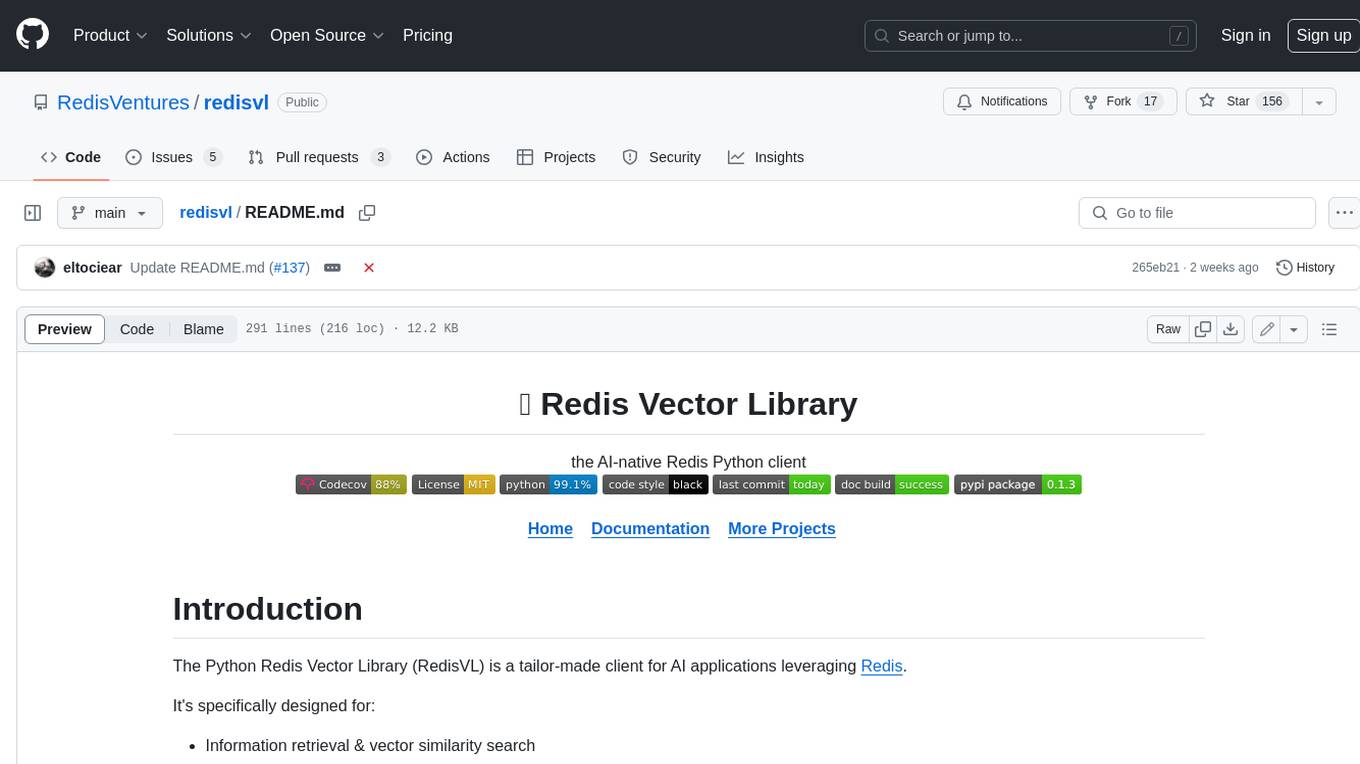
redisvl
Redis Vector Library (RedisVL) is a Python client library for building AI applications on top of Redis. It provides a high-level interface for managing vector indexes, performing vector search, and integrating with popular embedding models and providers. RedisVL is designed to make it easy for developers to build and deploy AI applications that leverage the speed, flexibility, and reliability of Redis.
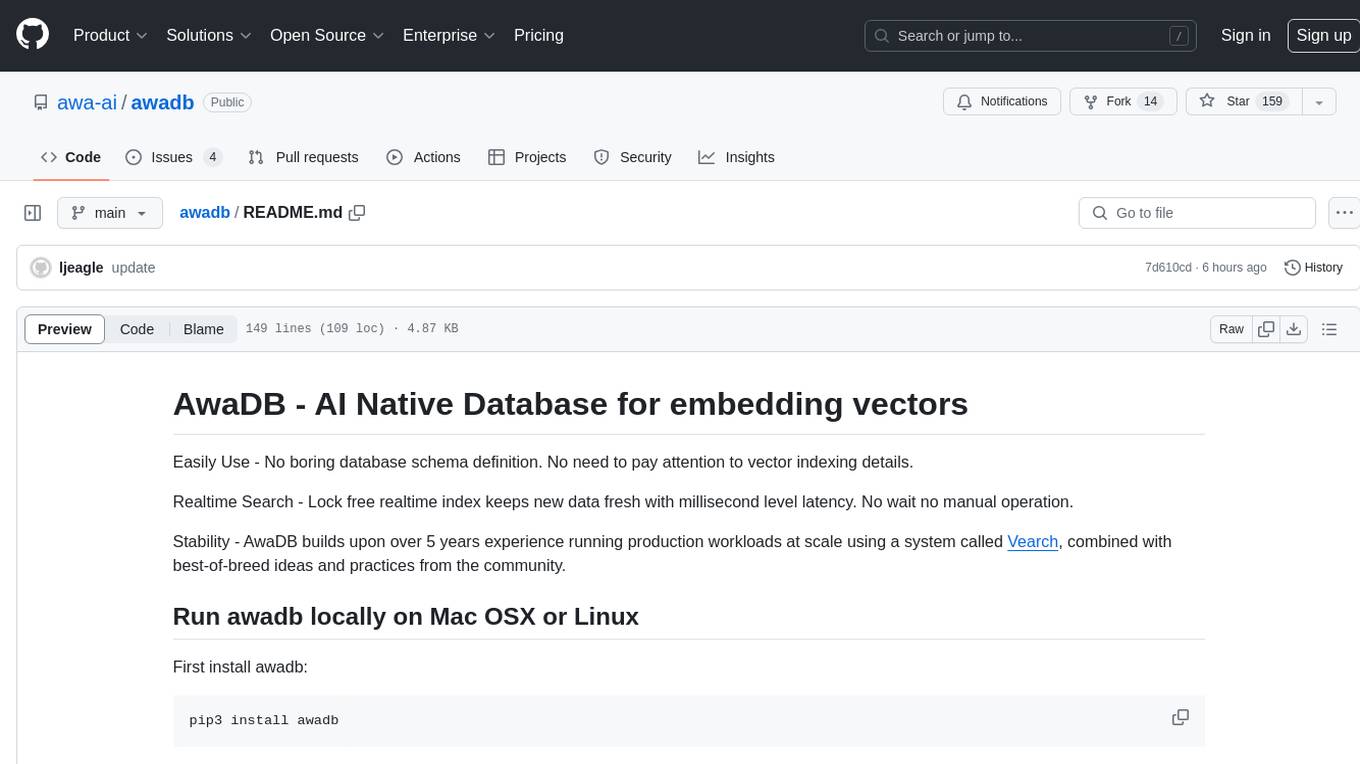
awadb
AwaDB is an AI native database designed for embedding vectors. It simplifies database usage by eliminating the need for schema definition and manual indexing. The system ensures real-time search capabilities with millisecond-level latency. Built on 5 years of production experience with Vearch, AwaDB incorporates best practices from the community to offer stability and efficiency. Users can easily add and search for embedded sentences using the provided client libraries or RESTful API.
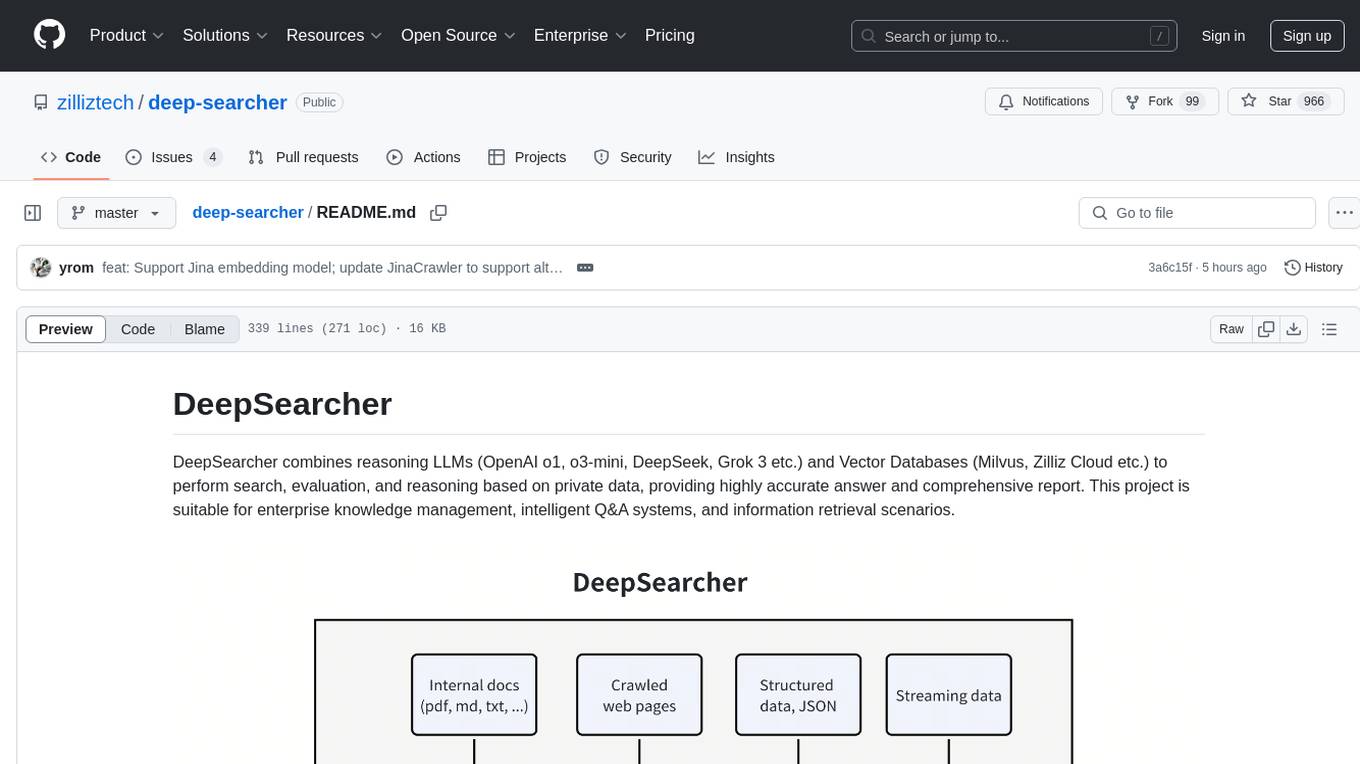
deep-searcher
DeepSearcher is a tool that combines reasoning LLMs and Vector Databases to perform search, evaluation, and reasoning based on private data. It is suitable for enterprise knowledge management, intelligent Q&A systems, and information retrieval scenarios. The tool maximizes the utilization of enterprise internal data while ensuring data security, supports multiple embedding models, and provides support for multiple LLMs for intelligent Q&A and content generation. It also includes features like private data search, vector database management, and document loading with web crawling capabilities under development.
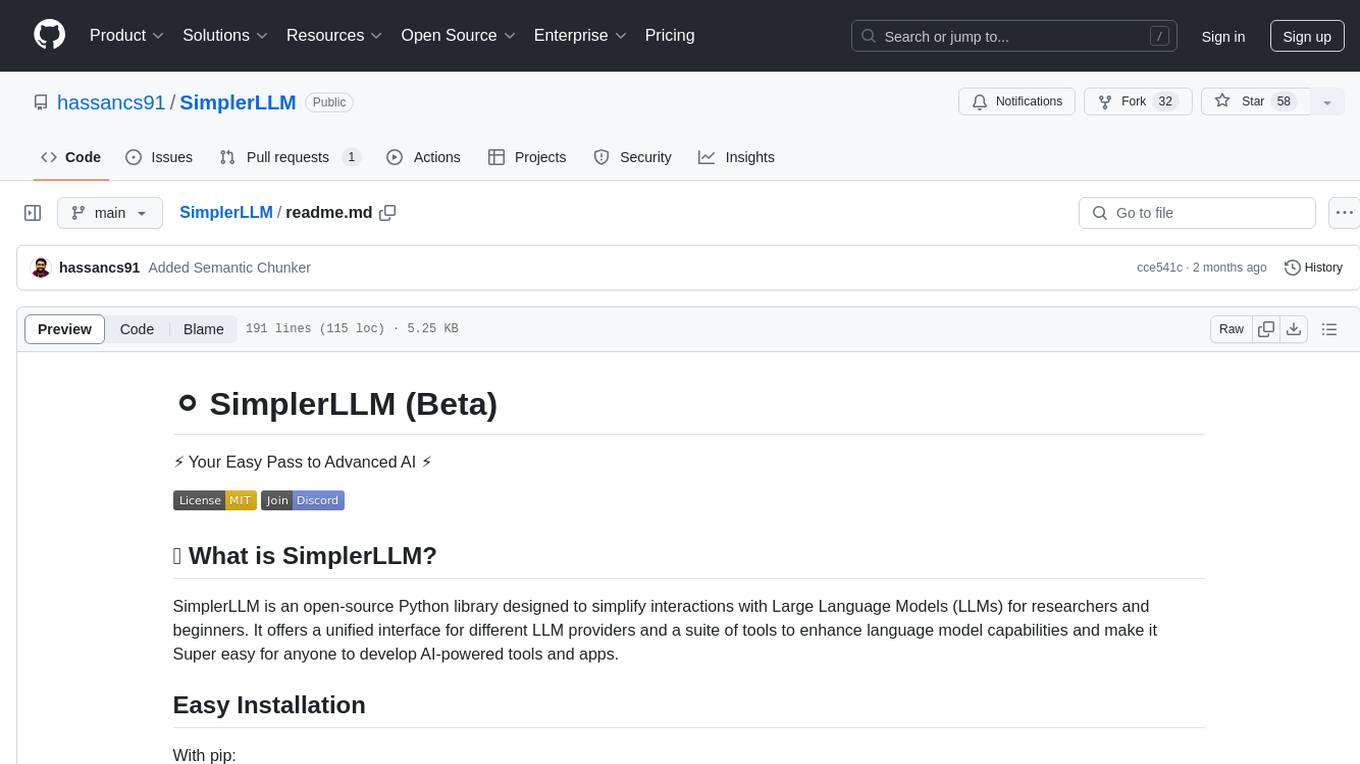
SimplerLLM
SimplerLLM is an open-source Python library that simplifies interactions with Large Language Models (LLMs) for researchers and beginners. It provides a unified interface for different LLM providers, tools for enhancing language model capabilities, and easy development of AI-powered tools and apps. The library offers features like unified LLM interface, generic text loader, RapidAPI connector, SERP integration, prompt template builder, and more. Users can easily set up environment variables, create LLM instances, use tools like SERP, generic text loader, calling RapidAPI APIs, and prompt template builder. Additionally, the library includes chunking functions to split texts into manageable chunks based on different criteria. Future updates will bring more tools, interactions with local LLMs, prompt optimization, response evaluation, GPT Trainer, document chunker, advanced document loader, integration with more providers, Simple RAG with SimplerVectors, integration with vector databases, agent builder, and LLM server.
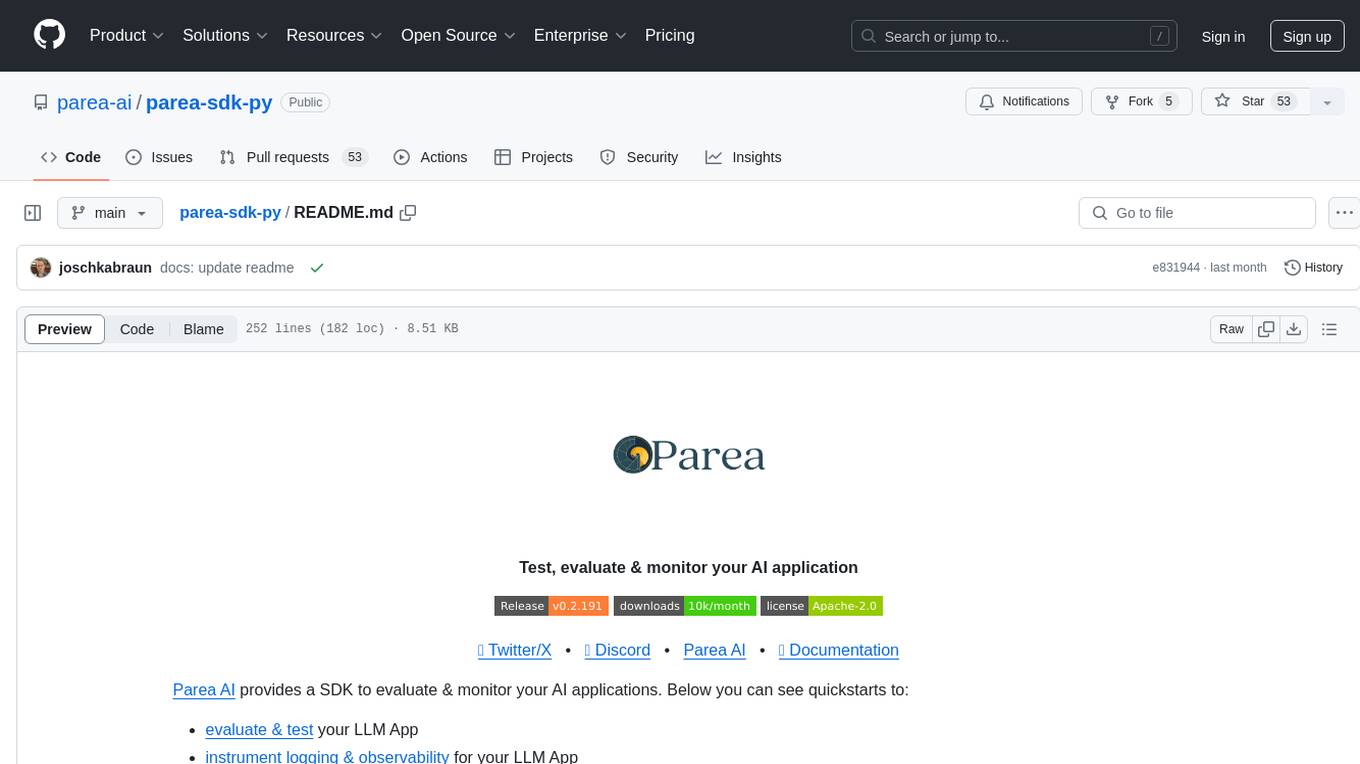
parea-sdk-py
Parea AI provides a SDK to evaluate & monitor AI applications. It allows users to test, evaluate, and monitor their AI models by defining and running experiments. The SDK also enables logging and observability for AI applications, as well as deploying prompts to facilitate collaboration between engineers and subject-matter experts. Users can automatically log calls to OpenAI and Anthropic, create hierarchical traces of their applications, and deploy prompts for integration into their applications.
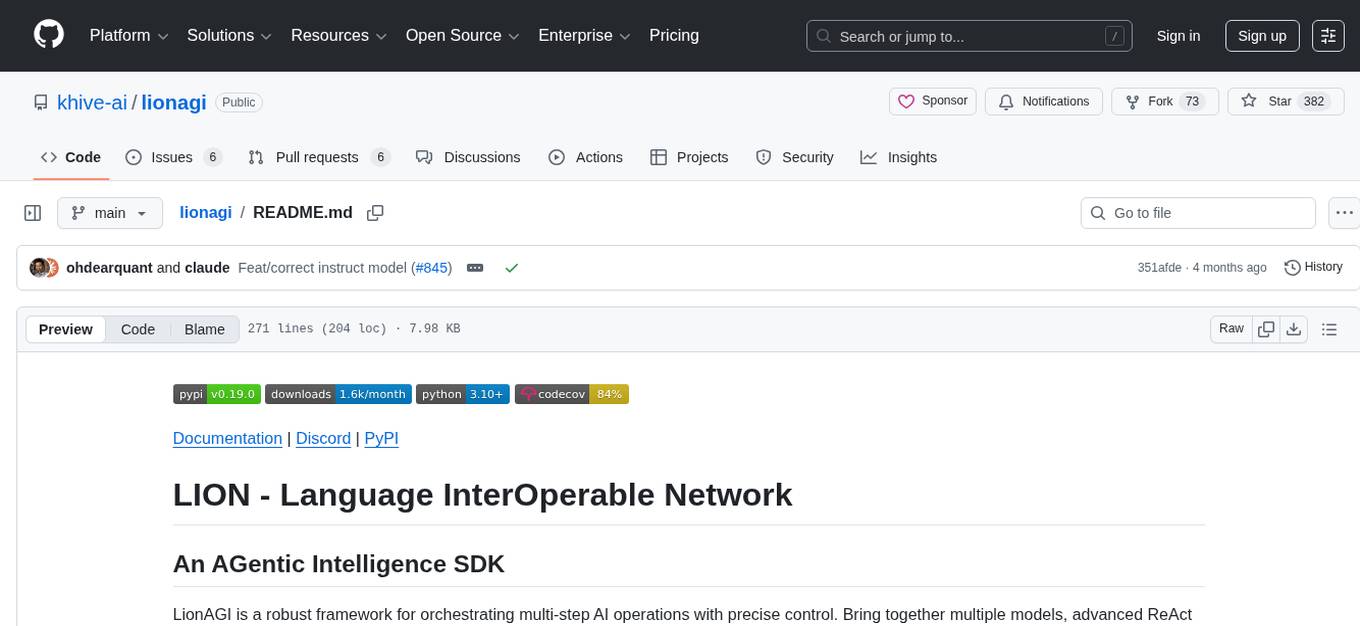
lionagi
LionAGI is a robust framework for orchestrating multi-step AI operations with precise control. It allows users to bring together multiple models, advanced reasoning, tool integrations, and custom validations in a single coherent pipeline. The framework is structured, expandable, controlled, and transparent, offering features like real-time logging, message introspection, and tool usage tracking. LionAGI supports advanced multi-step reasoning with ReAct, integrates with Anthropic's Model Context Protocol, and provides observability and debugging tools. Users can seamlessly orchestrate multiple models, integrate with Claude Code CLI SDK, and leverage a fan-out fan-in pattern for orchestration. The framework also offers optional dependencies for additional functionalities like reader tools, local inference support, rich output formatting, database support, and graph visualization.
aiavatarkit
AIAvatarKit is a tool for building AI-based conversational avatars quickly. It supports various platforms like VRChat and cluster, along with real-world devices. The tool is extensible, allowing unlimited capabilities based on user needs. It requires VOICEVOX API, Google or Azure Speech Services API keys, and Python 3.10. Users can start conversations out of the box and enjoy seamless interactions with the avatars.
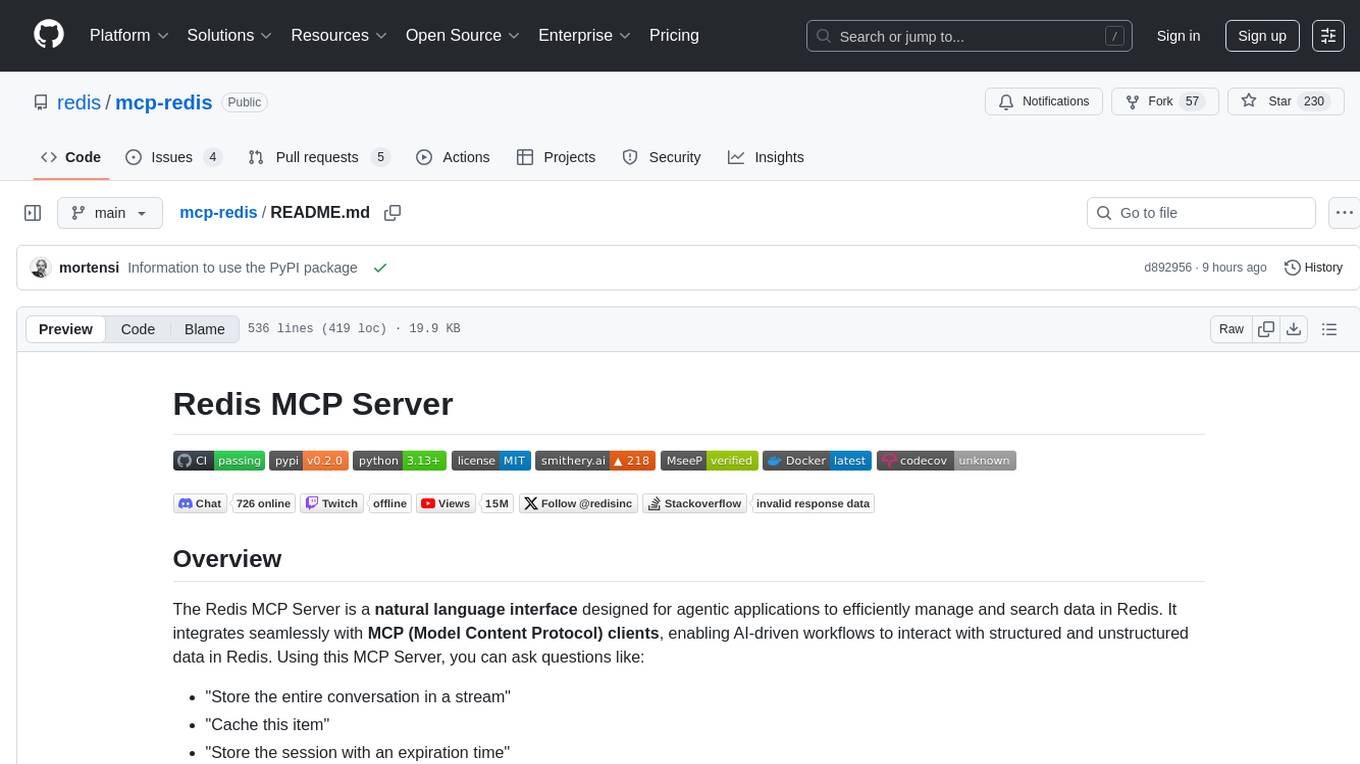
mcp-redis
The Redis MCP Server is a natural language interface designed for agentic applications to efficiently manage and search data in Redis. It integrates seamlessly with MCP (Model Content Protocol) clients, enabling AI-driven workflows to interact with structured and unstructured data in Redis. The server supports natural language queries, seamless MCP integration, full Redis support for various data types, search and filtering capabilities, scalability, and lightweight design. It provides tools for managing data stored in Redis, such as string, hash, list, set, sorted set, pub/sub, streams, JSON, query engine, and server management. Installation can be done from PyPI or GitHub, with options for testing, development, and Docker deployment. Configuration can be via command line arguments or environment variables. Integrations include OpenAI Agents SDK, Augment, Claude Desktop, and VS Code with GitHub Copilot. Use cases include AI assistants, chatbots, data search & analytics, and event processing. Contributions are welcome under the MIT License.
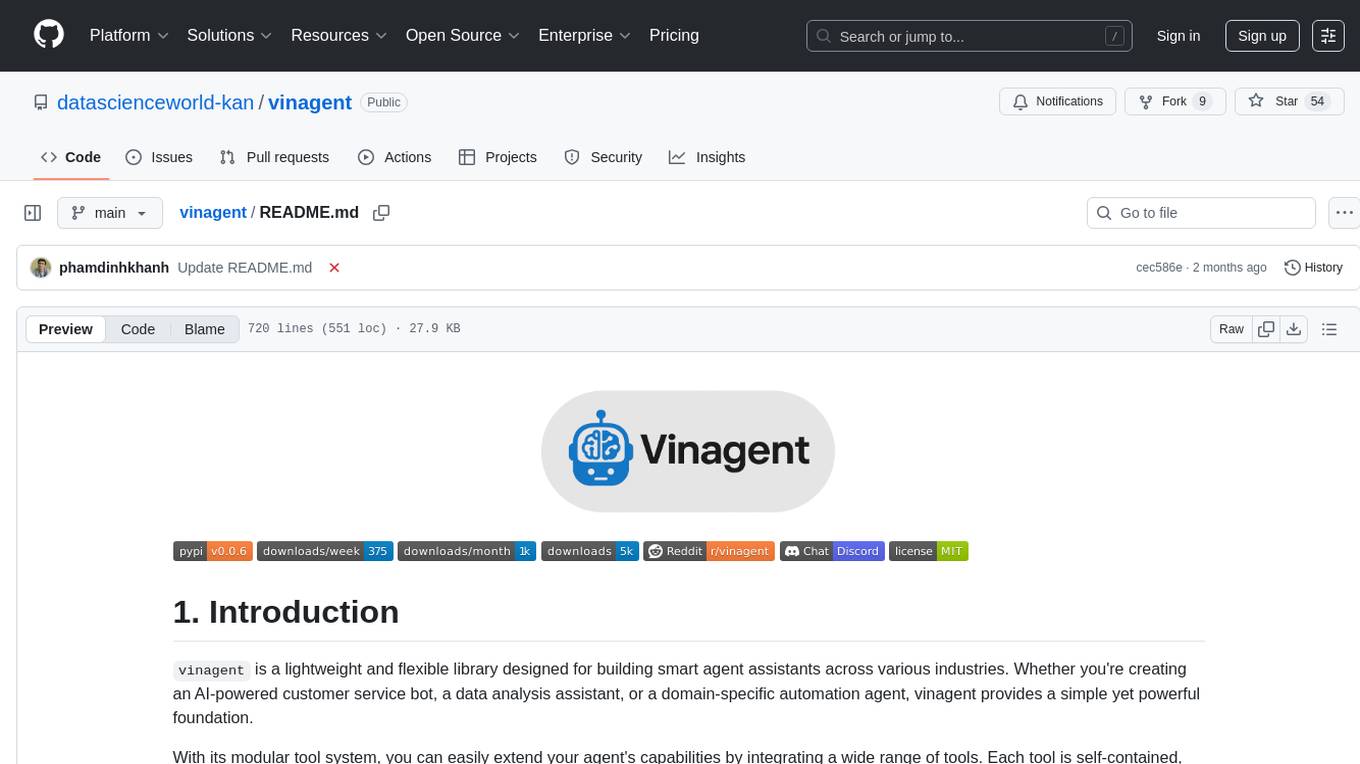
vinagent
Vinagent is a lightweight and flexible library designed for building smart agent assistants across various industries. It provides a simple yet powerful foundation for creating AI-powered customer service bots, data analysis assistants, or domain-specific automation agents. With its modular tool system, users can easily extend their agent's capabilities by integrating a wide range of tools that are self-contained, well-documented, and can be registered dynamically. Vinagent allows users to scale and adapt their agents to new tasks or environments effortlessly.
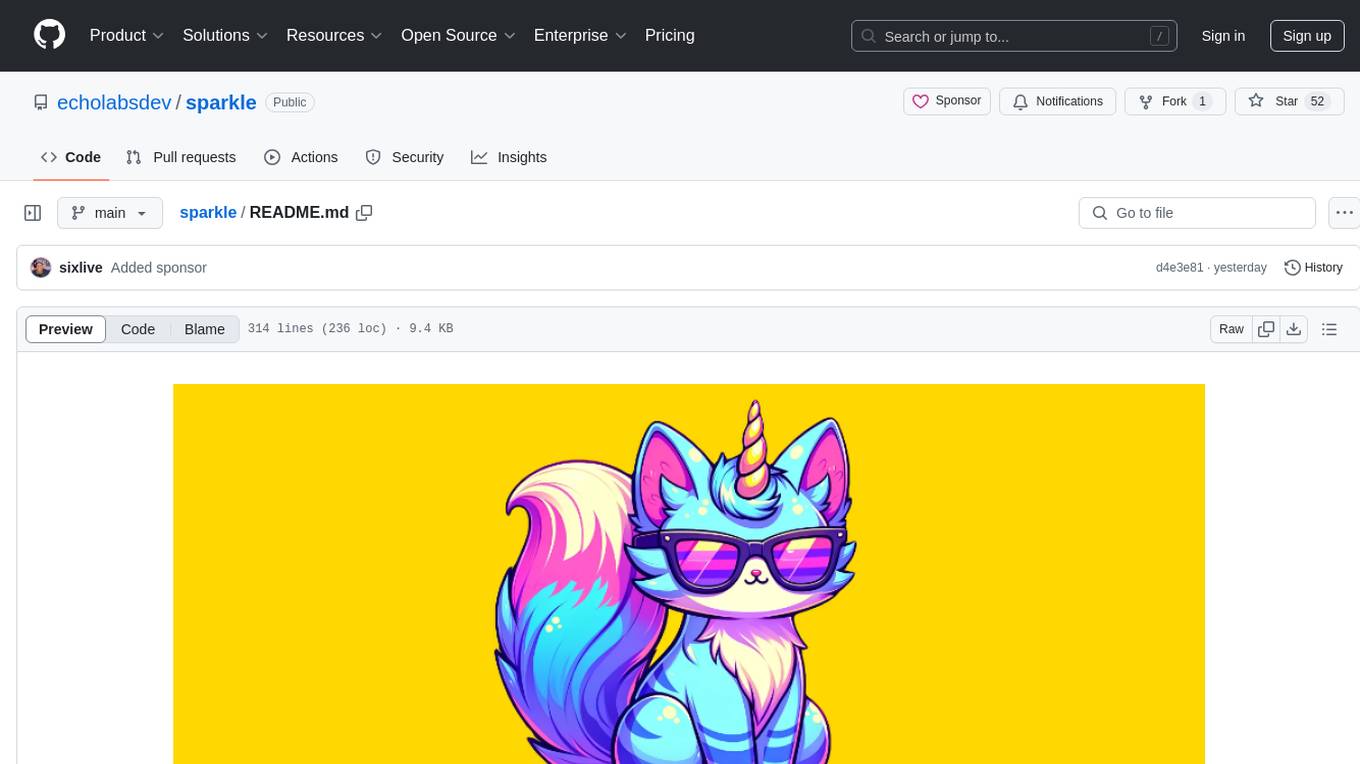
sparkle
Sparkle is a tool that streamlines the process of building AI-driven features in applications using Large Language Models (LLMs). It guides users through creating and managing agents, defining tools, and interacting with LLM providers like OpenAI. Sparkle allows customization of LLM provider settings, model configurations, and provides a seamless integration with Sparkle Server for exposing agents via an OpenAI-compatible chat API endpoint.
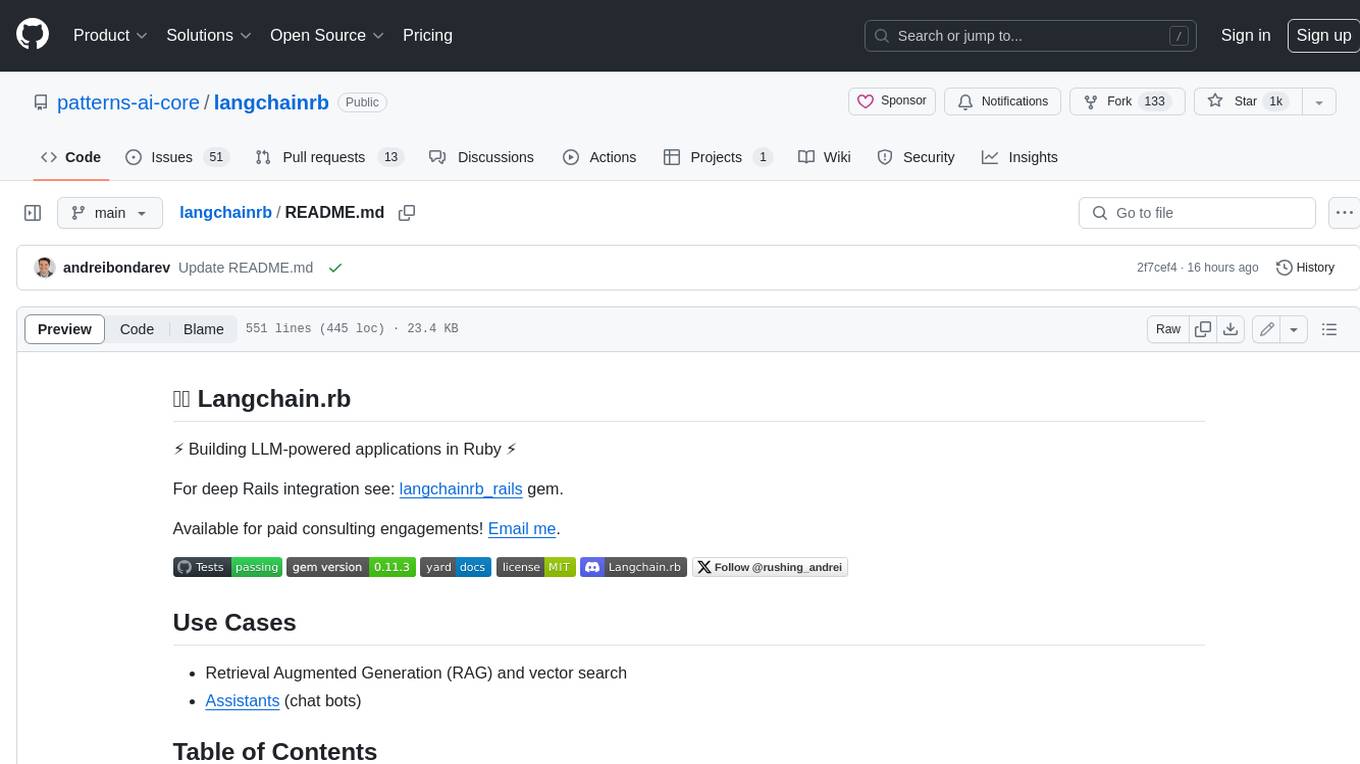
langchainrb
Langchain.rb is a Ruby library that makes it easy to build LLM-powered applications. It provides a unified interface to a variety of LLMs, vector search databases, and other tools, making it easy to build and deploy RAG (Retrieval Augmented Generation) systems and assistants. Langchain.rb is open source and available under the MIT License.
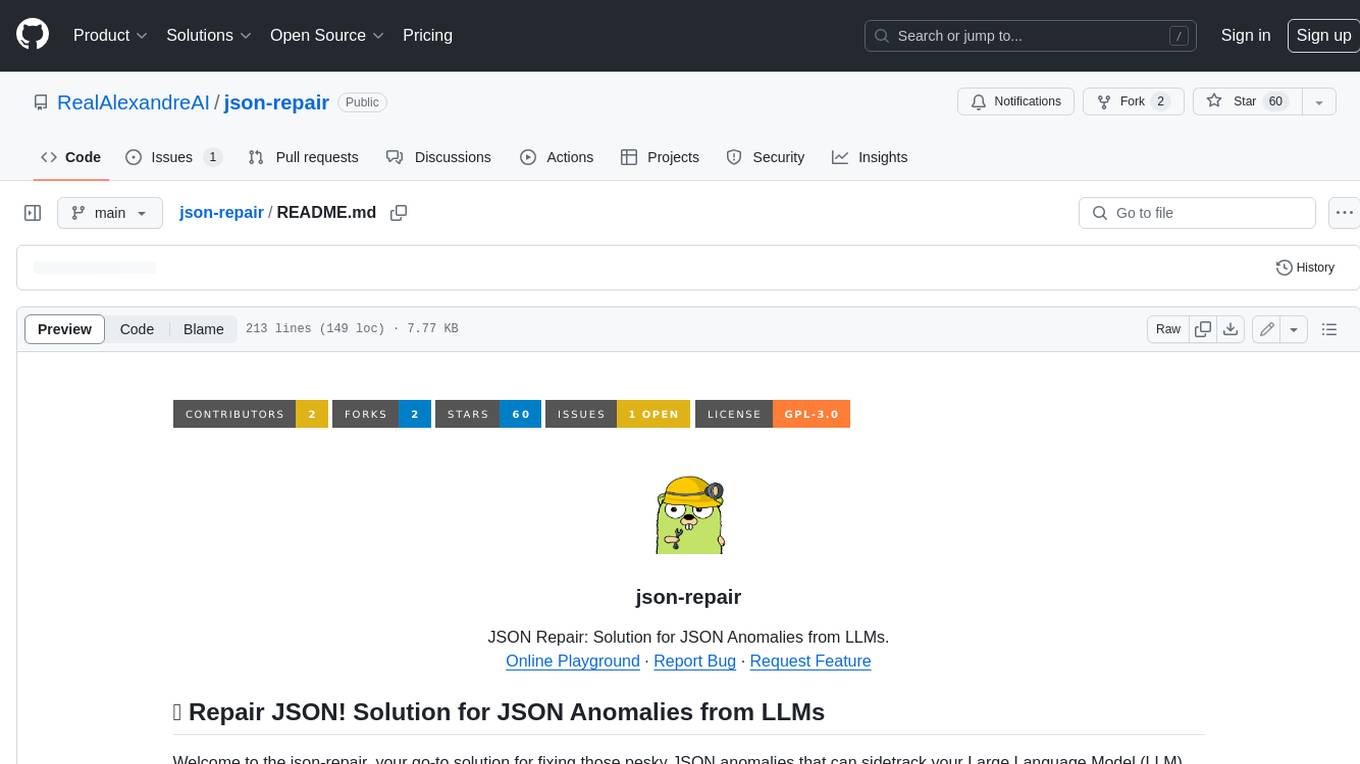
json-repair
JSON Repair is a toolkit designed to address JSON anomalies that can arise from Large Language Models (LLMs). It offers a comprehensive solution for repairing JSON strings, ensuring accuracy and reliability in your data processing. With its user-friendly interface and extensive capabilities, JSON Repair empowers developers to seamlessly integrate JSON repair into their workflows.
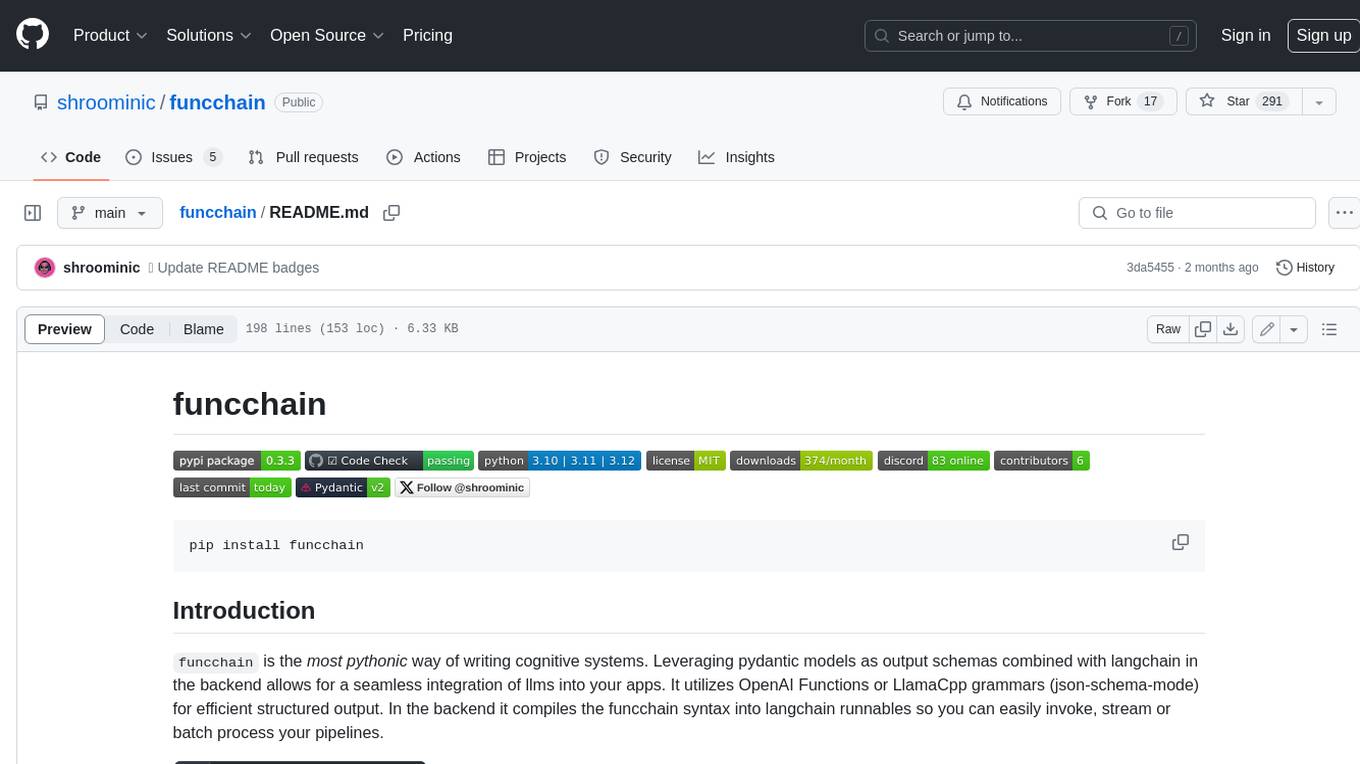
funcchain
Funcchain is a Python library that allows you to easily write cognitive systems by leveraging Pydantic models as output schemas and LangChain in the backend. It provides a seamless integration of LLMs into your apps, utilizing OpenAI Functions or LlamaCpp grammars (json-schema-mode) for efficient structured output. Funcchain compiles the Funcchain syntax into LangChain runnables, enabling you to invoke, stream, or batch process your pipelines effortlessly.
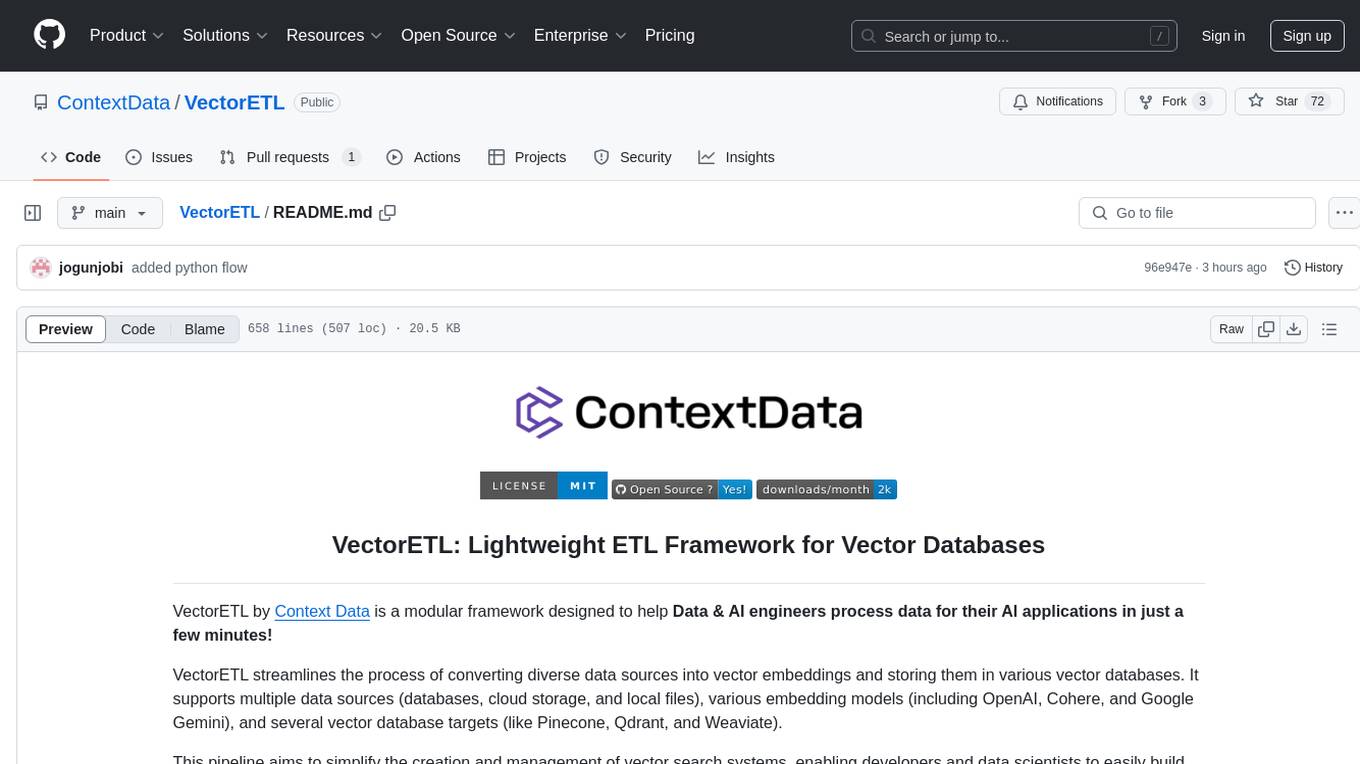
VectorETL
VectorETL is a lightweight ETL framework designed to assist Data & AI engineers in processing data for AI applications quickly. It streamlines the conversion of diverse data sources into vector embeddings and storage in various vector databases. The framework supports multiple data sources, embedding models, and vector database targets, simplifying the creation and management of vector search systems for semantic search, recommendation systems, and other vector-based operations.

langserve
LangServe helps developers deploy `LangChain` runnables and chains as a REST API. This library is integrated with FastAPI and uses pydantic for data validation. In addition, it provides a client that can be used to call into runnables deployed on a server. A JavaScript client is available in LangChain.js.
For similar tasks

redis-vl-python
The Python Redis Vector Library (RedisVL) is a tailor-made client for AI applications leveraging Redis. It enhances applications with Redis' speed, flexibility, and reliability, incorporating capabilities like vector-based semantic search, full-text search, and geo-spatial search. The library bridges the gap between the emerging AI-native developer ecosystem and the capabilities of Redis by providing a lightweight, elegant, and intuitive interface. It abstracts the features of Redis into a grammar that is more aligned to the needs of today's AI/ML Engineers or Data Scientists.
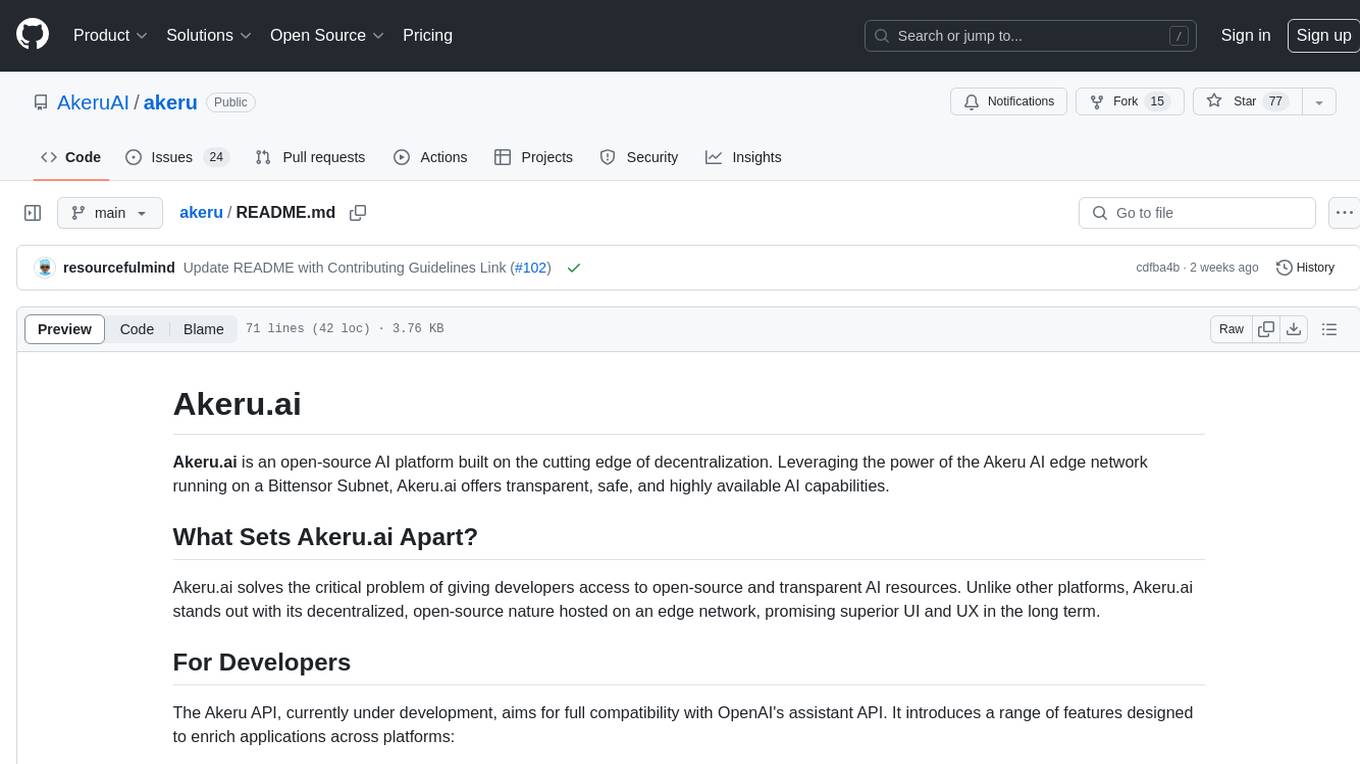
akeru
Akeru.ai is an open-source AI platform leveraging the power of decentralization. It offers transparent, safe, and highly available AI capabilities. The platform aims to give developers access to open-source and transparent AI resources through its decentralized nature hosted on an edge network. Akeru API introduces features like retrieval, function calling, conversation management, custom instructions, data input optimization, user privacy, testing and iteration, and comprehensive documentation. It is ideal for creating AI agents and enhancing web and mobile applications with advanced AI capabilities. The platform runs on a Bittensor Subnet design that aims to democratize AI technology and promote an equitable AI future. Akeru.ai embraces decentralization challenges to ensure a decentralized and equitable AI ecosystem with security features like watermarking and network pings. The API architecture integrates with technologies like Bun, Redis, and Elysia for a robust, scalable solution.
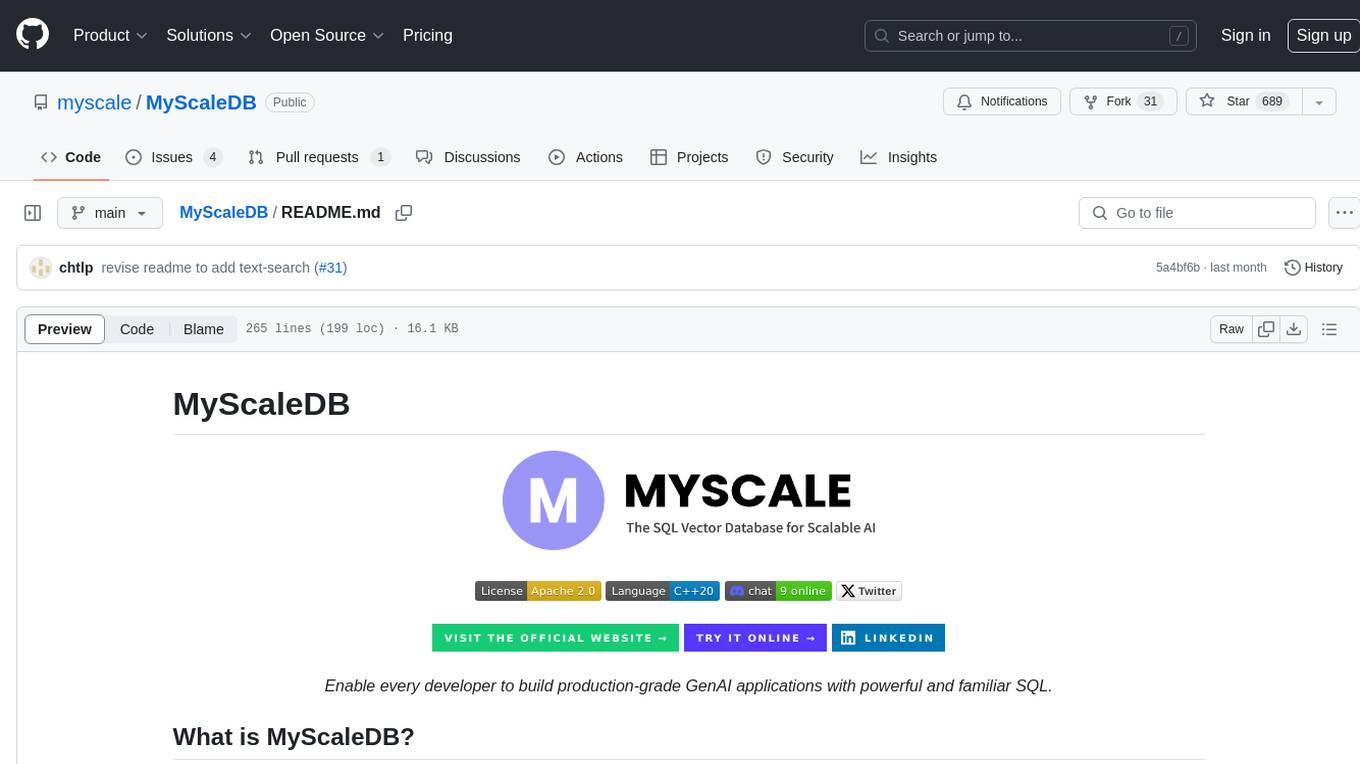
MyScaleDB
MyScaleDB is a SQL vector database optimized for AI applications, enabling developers to manage and process massive volumes of data efficiently. It offers fast and powerful vector search, filtered search, and SQL-vector join queries, making it fully SQL-compatible. MyScaleDB provides unmatched performance and scalability by leveraging cutting-edge OLAP database architecture and advanced vector algorithms. It is production-ready for AI applications, supporting structured data, text, vector, JSON, geospatial, and time-series data. MyScale Cloud offers fully-managed MyScaleDB with premium features on billion-scale data, making it cost-effective and simpler to use compared to specialized vector databases. Built on top of ClickHouse, MyScaleDB combines structured and vector search efficiently, ensuring high accuracy and performance in filtered search operations.
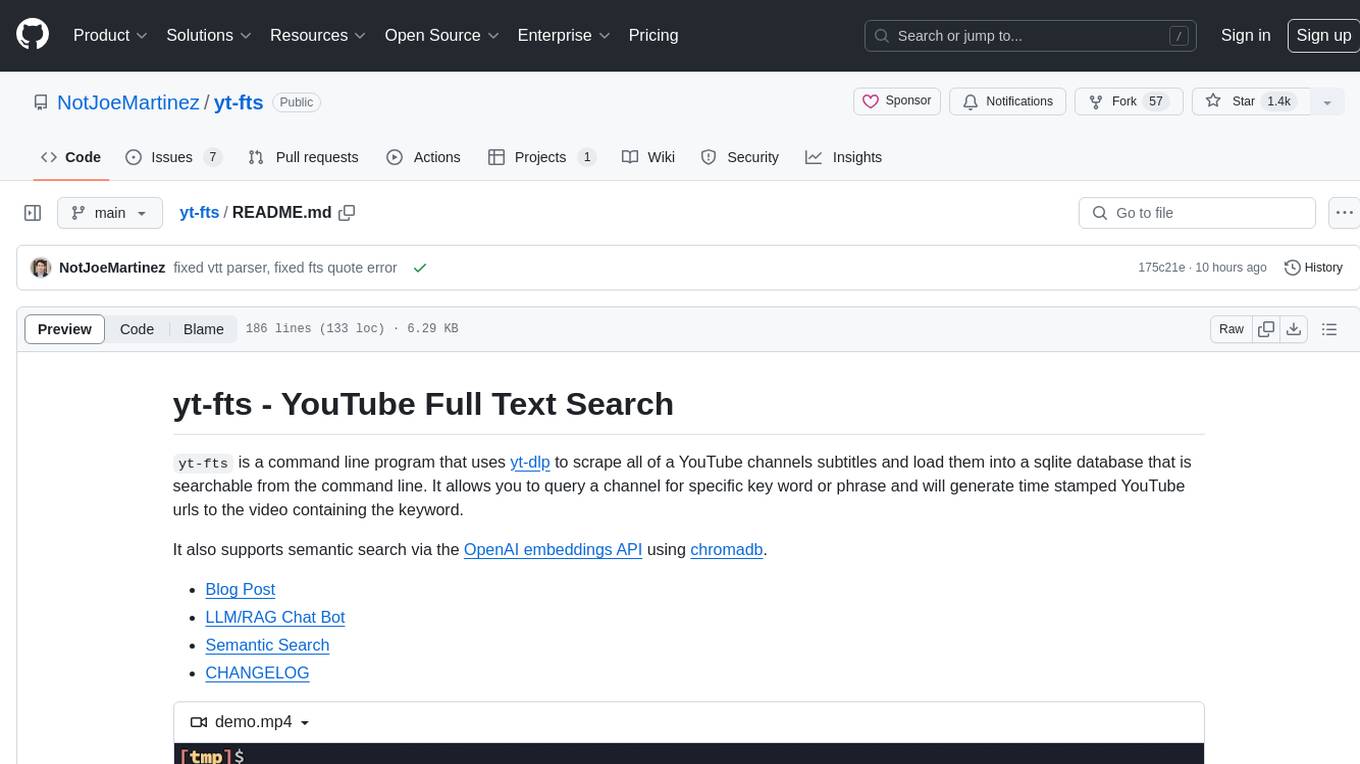
yt-fts
yt-fts is a command line program that uses yt-dlp to scrape all of a YouTube channels subtitles and load them into a sqlite database for full text search. It allows users to query a channel for specific keywords or phrases and generates time stamped YouTube URLs to the videos containing the keyword. Additionally, it supports semantic search via the OpenAI embeddings API using chromadb.
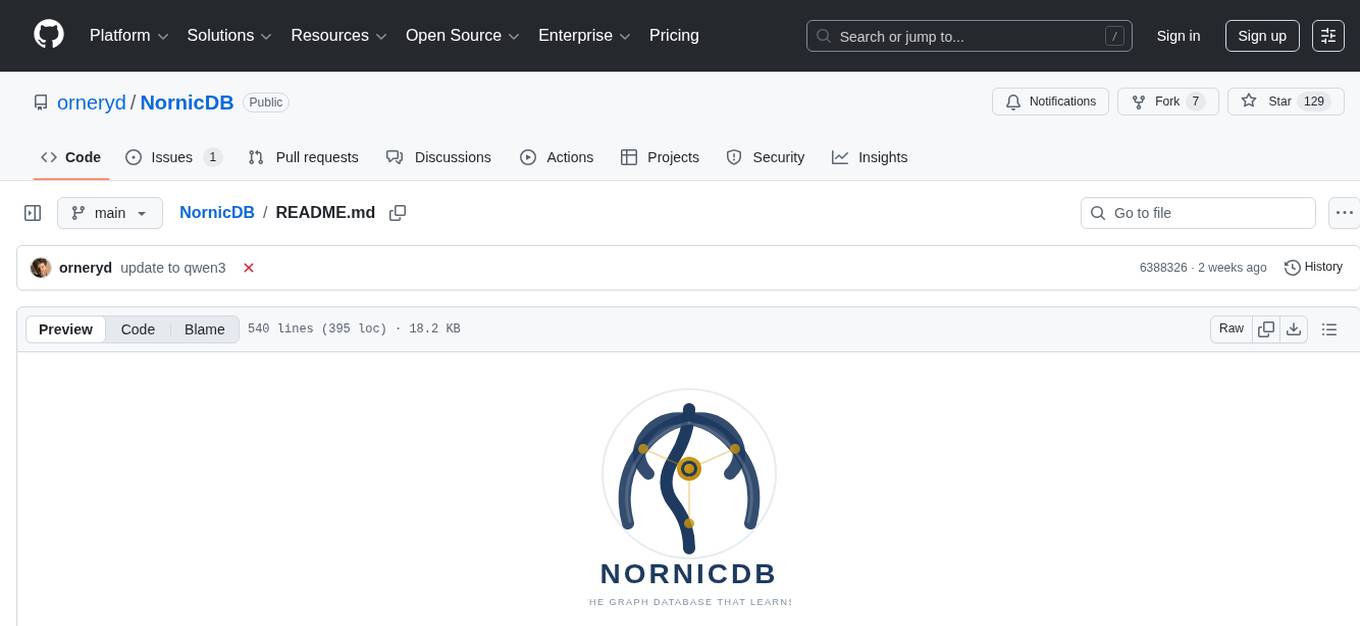
NornicDB
NornicDB is a high-performance graph database designed for AI agents and knowledge systems. It is Neo4j-compatible, GPU-accelerated, and features memory that evolves. The database automatically discovers and manages relationships in the data, allowing meaning to emerge from the knowledge graph. NornicDB is suitable for AI agent memory, knowledge graphs, RAG systems, session context, and research tools. It offers features like intelligent memory, auto-relationships, performance benchmarks, vector search, Heimdall AI assistant, APOC functions, and various Docker images for different platforms. The tool is built with Neo4j Bolt protocol, Cypher query engine, memory decay system, GPU acceleration, vector search, auto-relationship engine, and more.
For similar jobs

sweep
Sweep is an AI junior developer that turns bugs and feature requests into code changes. It automatically handles developer experience improvements like adding type hints and improving test coverage.

teams-ai
The Teams AI Library is a software development kit (SDK) that helps developers create bots that can interact with Teams and Microsoft 365 applications. It is built on top of the Bot Framework SDK and simplifies the process of developing bots that interact with Teams' artificial intelligence capabilities. The SDK is available for JavaScript/TypeScript, .NET, and Python.

ai-guide
This guide is dedicated to Large Language Models (LLMs) that you can run on your home computer. It assumes your PC is a lower-end, non-gaming setup.

classifai
Supercharge WordPress Content Workflows and Engagement with Artificial Intelligence. Tap into leading cloud-based services like OpenAI, Microsoft Azure AI, Google Gemini and IBM Watson to augment your WordPress-powered websites. Publish content faster while improving SEO performance and increasing audience engagement. ClassifAI integrates Artificial Intelligence and Machine Learning technologies to lighten your workload and eliminate tedious tasks, giving you more time to create original content that matters.

chatbot-ui
Chatbot UI is an open-source AI chat app that allows users to create and deploy their own AI chatbots. It is easy to use and can be customized to fit any need. Chatbot UI is perfect for businesses, developers, and anyone who wants to create a chatbot.

BricksLLM
BricksLLM is a cloud native AI gateway written in Go. Currently, it provides native support for OpenAI, Anthropic, Azure OpenAI and vLLM. BricksLLM aims to provide enterprise level infrastructure that can power any LLM production use cases. Here are some use cases for BricksLLM: * Set LLM usage limits for users on different pricing tiers * Track LLM usage on a per user and per organization basis * Block or redact requests containing PIIs * Improve LLM reliability with failovers, retries and caching * Distribute API keys with rate limits and cost limits for internal development/production use cases * Distribute API keys with rate limits and cost limits for students

uAgents
uAgents is a Python library developed by Fetch.ai that allows for the creation of autonomous AI agents. These agents can perform various tasks on a schedule or take action on various events. uAgents are easy to create and manage, and they are connected to a fast-growing network of other uAgents. They are also secure, with cryptographically secured messages and wallets.

griptape
Griptape is a modular Python framework for building AI-powered applications that securely connect to your enterprise data and APIs. It offers developers the ability to maintain control and flexibility at every step. Griptape's core components include Structures (Agents, Pipelines, and Workflows), Tasks, Tools, Memory (Conversation Memory, Task Memory, and Meta Memory), Drivers (Prompt and Embedding Drivers, Vector Store Drivers, Image Generation Drivers, Image Query Drivers, SQL Drivers, Web Scraper Drivers, and Conversation Memory Drivers), Engines (Query Engines, Extraction Engines, Summary Engines, Image Generation Engines, and Image Query Engines), and additional components (Rulesets, Loaders, Artifacts, Chunkers, and Tokenizers). Griptape enables developers to create AI-powered applications with ease and efficiency.





